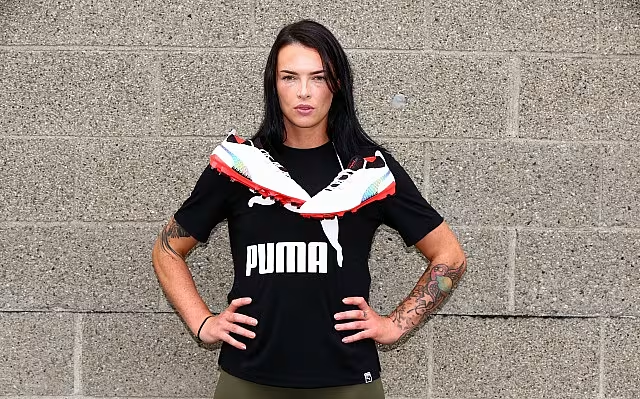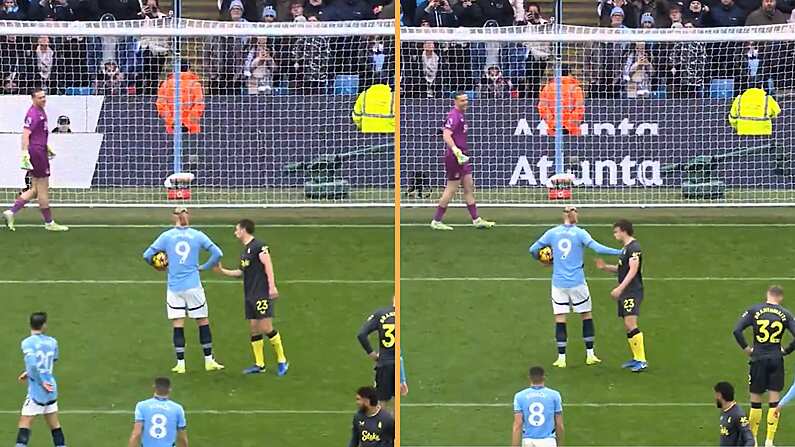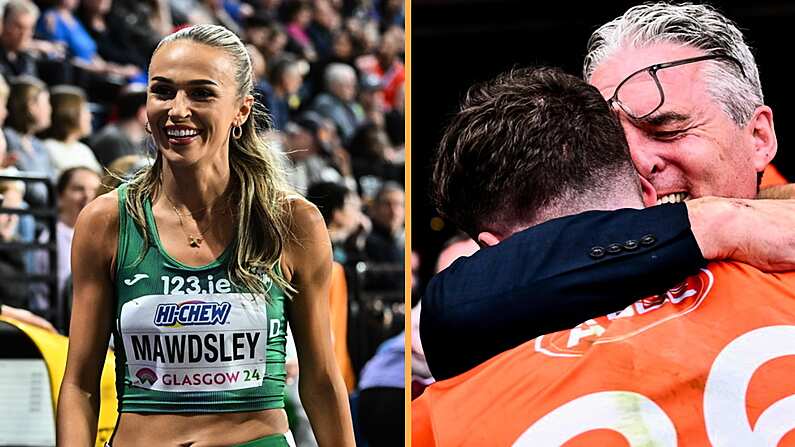A young fan sheepishly approaches Ashling Thompson with a newly purchased pair of boots in his grasp. Her signature, on both boots, is what he wants. She kindly obliges, while also admiring his new prized possession.
‘If you told me that I’d be in the position I am now when I was going through that, I would have said you’re absolutely crazy. I just would never have pictured being in this position,’ says PUMA ONE player Thompson.
The ordeal of which she speaks is a serious battle with depression. It’s a battle she has won but also one she’s glad to have fought. It shaped her - the Cork woman believes she would not be the person she is today without having lived that experience.
I’d never take it back. It was extremely difficult and I’ve had to face a lot of things in life that nobody should have to face. As I said, I’d never take it back because I wouldn’t be the person or player I am today.
Having emerged on the other side, she’s made it her mission to help guide others through the mist. She knows the road and its bumps and hollows.
Cork’s 2015 All-Ireland winning camogie captain works with Pieta House - the Suicide And Self-Harm Crisis Centre - and speaks about her own troubles whenever the opportunity arises.
I always say that I was the girl who felt there was nobody I could read about. I just didn’t see it anywhere, you just didn’t see GAA players or sports people in general opening up about their mental health. That’s the reason I chose to speak about it because I was that teenager and I wouldn’t want anyone else to feel that way.
The main reason was to help people but it goes hand-in-hand with myself as well; it helps me so much to talk about it. That was my biggest problem, I never told anyone or spoke about it but when I did I started to gradually feel so much better and not be ashamed.
It’s five years since Thompson first spoke publicly about her internal troubles. The first time she did, it was unintentional. The interviewer was mostly interested in her tattoos - which are numerous and all have reasons behind them - and a bit in her camogie career, the rest just came trickling out, a dam that needed to be relieved of pressure.
Initially, she was apprehensive, scared, wondering what people would think but a message from a young fan eased any worries.
It was a kid, a teenager who had messaged me and just said that they had their own issues and difficulties. Basically, they said that interview changed their whole outlook because they’d never heard a GAA player speak about it.
When they read the article, they genuinely said, ‘That gives me a whole different perspective on life as well.’ To see a GAA player, a camogie player come out and talk about it was just something you never see.
It just taught that person that they have nothing to be ashamed of. They just appreciated that I was using my platform to share my story. They just got so much from it.
There were thousands of emails after that and still to this day I get them about how I’ve changed people’s perspective and how I’ve made them feel so much better about their situation.
And so she kept talking - ‘there’s always a new reader’ is the rock solid foundation of her rationale.
Her journey from choppy waters to still conditions was not a solo expedition. There was help along the way. After hitting what she calls rock bottom mentally and physically, Thompson knew something had to change.

‘I was just at a crossroads I suppose and didn’t really have a choice. It’s either that things are going to stay the way they are and not get better or I can try to do something about it. It’s not as easy as that but it was just the last straw for me, I was fed up of feeling the way I did. So I started to reach out and see.’ she says.
When she did reach out, she found a connection - Frank Flannery, a coach with her club, Milford GAA.
I went back playing into my sport because we got a new coach into our club team who I really connected with. It was that coach who really turned things around for me. He would have been the first person I opened up to about mental health.
He’s world renowned at this stage. I talk about him all the time. People say he must be getting paid big money because I never shut up about him. I couldn’t talk about him enough. It’s making that effort to find one gateway and thankfully Frankie was mine.
He’s not our coach but he’s still a coach. I could ring him right now and I guarantee he’d answer. I haven’t spoke to him in a while but he’s just someone you can always pick up the phone to for years to come.
Flannery made her feel comfortable, like she was no different to anyone else. The player and coach relationship just worked. She’d never met someone who cared like he did, someone who wanted to know her on a personal level.
Flannery had a level of empathy she believes stems from having faced his own obstacles. ‘He genuinely brought me to the player I am today. I can’t thank him enough,’ she smiles.

The person - and player - she is now is markedly different from years past. Once a ‘speedy goal poacher’, she has morphed into a strong character on the pitch, a real physical presence, someone who’s serious about their sport.
To have a fly on the wall view of what she was like six or seven years ago is a perspective she’d love. She knows how much she has changed as an individual during the intervening years.
I kind of started to not trust a lot of people and fell out with a lot of people. That was me. With depression and stuff, you do get other symptoms like paranoia and you feel like everyone’s talking about you. You just change and I completely changed as a person. I was so angry and couldn’t figure out what was wrong with me. I felt the whole world was against me. That’s why I was so close minded.
And now?
I’m just very passionate but very soft as well at the same time.
I think there’s a different dynamic to me. I’m a lot more open to new things and new experiences. I just see life so differently. I think that’s one of the top things when you do come through depression, you see the world so different; that there’s so much out there for you that you never thought could possibly happen.
That seam of optimism has led her to mine avenues of altruism which she promotes through her personal brand. Along with Pieta House, Thompson also works with GiveBlood.ie helping to dispel some myths about blood donation and encourage others to contribute to the national supply.
A car crash which she involved in at just 19 - a major factor in her descent into depression - is one of her personal reasons for wanting to promote blood donation. 'Up to 30 units of blood can be used in the event of a car accident,' she imparts.
That’s how important it is to donate blood. I think only 3 per cent of the population do it which is really disappointing. I think people just don’t think about it, somebody’s life could be on the line, it could be your mother, your brother, your sister - it could be you.
Giving back, it's something Ashling Thompson loves doing and she's not going to stop anytime soon.
If you or anyone you know has been affected by the issues raised in this interview, please contact Pieta House or The Samaritans.
PUMA athlete Ashling Thompson met with ten lucky fans at O’Neill’s Sportswear ahead of Cork's GAA semi-final. Ashling will be wearing the PUMA ONE boot, the boot for every ONE and every player. Get yours NOW at O’Neills #PlayPerfect #PUMAONE













